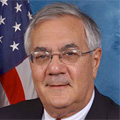Online gambling debate between Barney Frank and Spencer Bachus
Friday, June 05, 2009
Online gambling debate between Barney Frank and Spencer Bachus
The online editorial US News has published a legalisation of online gambling debate between pro-gambling activist Barney Frank and his anti-gambling opponent Spencer Bachus, both of whom are US senators serving on the House Financial Services Committee.
In summary, Frank argues for personal freedom on the basis of a harmless adult activity; Bachus argues against the risks involved in gambling, and suggests that the recent prohibitionist legislation is working.
Here are both statements:
With Gambling, Personal Freedom Is Always the Best Bet, Says Barney Frank
There is one major reason that leads me to oppose the ban on Internet gambling: It is an activity that adult Americans enjoy and that does no conceivable harm to anybody else.
(more)
There is one major reason that leads me to oppose the ban on Internet gambling: It is an activity that adult Americans enjoy and that does no conceivable harm to anybody else.
(more)
Online Gambling Leads to Crime and Hurts Young, So Why Encourage It? Asks Spencer Bachus
In the history of our country, the federal government has never authorized or sanctioned gambling of any kind. Now, offshore casino interests are leading an unprecedented effort to legalize Internet gambling.
(more)
In the history of our country, the federal government has never authorized or sanctioned gambling of any kind. Now, offshore casino interests are leading an unprecedented effort to legalize Internet gambling.
(more)

• Barney Frank's opening statement that "...Internet gambling...is an activity that...does no conceivable harm to anybody else" is incorrect. He has at least chosen his words carefully - the word "else" is a vital addition, as to say that gambling harms nobody at all would be an absolute nonsense.
However, it is certainly not the case that gambling "does no conceivable harm to anybody else" - it can harm spouses, siblings and children, and can go on to harm even neighbours and outlying communities if the pathology is so deep as to lead to antisocial behaviour. An activity that incurs heavy financial loss will always have this potential affect.
That his opening statement, and presumably strongest argument, is simply wrong does not do his case any favours.
• Barney defends against the risks of underage gambling by suggesting that "...we do have ways of requiring that activities accessible through the internet have an enforceable age limit." Unfortunately, the legality of online gambling in the UK has not prevented underage gamblers from gambling, and there is realistically little that can be done to prevent a determined minor from accessing their parents' credit cards.
As such, I'm not sure what Senator Frank has in mind when he says this - underage gamblers will find a way. There being no details on offer, I suspect this is sound bite rather than substance on Barney's part.
For a very public underage online gambling debacle, see my Bella Vegas warning.
• Barney mentions the dire warnings of financing terrorism and money-laundering that the prohibitionists cite, saying that there is no evidence of this. This is true for terrorist activities as far as I know, but I do not see how the proceeds of online gambling being used to fund terrorism could ever be proven anyway, and as such this is a rather pointless argument.
Money laundering is certainly an issue - "chip-dumping" is a known money laundering procedure in poker rooms, although it is heavily guarded against in the more reputable rooms, with detection software and other such controls in place. Still, it is not the non-issue that Frank appears to suggest.
• The most convincing argument against prohibition is the one to which Frank has not really given much air time: that of the simple curtailing of personal freedom that prohibition represents. I find this very odd.
Has he abandoneded the stance, maybe seeing the waving of the flag of freedom as somehow analogous with the bible waving of the conservative anti-gambling advocates?
It does seem strange that he's left his trump card at home.

• Senator Bachus's initial arguments about the unique nature of online gambling are valid enough: online gambling is a 24/7 activity, and the use of credit cards does have the psychological effect of cloaking the reality of real money expenditure. Casino chips in brick and mortar casinos have a similar effect and are designed as such, and credit cards are an extension and furthering of this reality-masking. Quite true.
• However, Bacchus's arguments contain their fair share of inaccuracies: he refers to the "illegality" of online gambling, and cites the 2006 Internet Gambling Prohibition and Enforcement Act as an instrument of illegalisation. Neither is in fact correct.
The 1961 Wire Act applies only to sports betting, and the 2006 act did not technically illegalise online gambling. In fact, it didn't even illegalise properly the use of financial instruments to settle wagers as it was designed to, as it refers to "unlawful gambling", where nothing was ever actually illegalised.
That said, the UIGEA did have a very powerful effect on the online gambling industry, so it achieved its presumed objectives irrespective of the poor wording of the act.
• Bacchus cites an interesting statistic, that between 2006 and 2007, the year following the passage of the UIGEA, gambling on the part of college-age children fell from 5.8 percent to 1.5 percent. If this is correct it is a very positive outcome and a solid argument in favour of his stance.
• He also cites an example of the destructive power of gambling, someone who ended up in prison as a result of his exposure to gambling; this is a fairly standard tactic, and the anti-prohibitionists would say that these examples represent the the exception rather than the rule.
Of course, irrespective of the reasons for airing the issues, they remain valid per se.
My own stance?
I suspect both senators may be working to agendas, Frank for the online gambling lobbyists and Bacchus for the state gambling monopolies.
As a gambling webmaster, I set about advocating the best gambles available, those with the highest returns, indulged in on a controlled and planned basis. Gambling against the enormous disadvantages represented by slot machines and sports betting, far and away the most common form of gambling indulgence, I do not support.
As such, while I recognise the democratic desire for freedom in all things reasonable, I do not support the legalisation of online casino gambling in the US, or anything else which encorages irresponsible gambling.
Page top
Permalink
|
Reply (3)
| 

3 Previous Comments
Through integrated security, these casinos under the RTG brand also remain the most secure. แทงบอล
By leena pearl, at 10:51 am
It is late and no one else is awake. What you really want is a rousing game of poker. Happily, there are a number of chances to play poker at your online casino. 우리카지노
Online lottery betting website, Thai lottery, foreign lottery and stock lottery, update new system Deposit - withdraw faster Open 24 hours a day at hauyhuay.com : ทำนายฝัน
May 2005 | June 2005 | July 2005 | September 2005 | October 2005 | November 2005 | December 2005 | January 2006 | February 2006 | March 2006 | April 2006 | May 2006 | August 2006 | October 2006 | January 2007 | February 2007 | March 2007 | May 2007 | June 2007 | July 2007 | January 2008 | February 2008 | March 2008 | April 2008 | June 2008 | July 2008 | September 2008 | October 2008 | December 2008 | January 2009 | February 2009 | March 2009 | May 2009 | June 2009 | July 2009 | August 2009 | September 2009 | October 2009 | November 2009 | December 2009 | January 2010 | February 2010 | March 2010 | April 2010 | May 2010 | June 2010 | July 2010 | August 2010 | October 2010 | November 2010 | December 2010 | January 2011 | February 2011 | March 2011 | April 2011 | May 2011 | June 2011 | July 2011 | August 2011 | September 2011 | December 2011 | February 2012 | May 2012 | July 2012 | August 2012 | March 2016 | April 2016 | June 2016 | November 2016 | December 2016 | March 2017 | May 2017 | June 2017 | August 2017 | August 2021 | October 2021 | May 2022 | December 2023 | May 2024 | Atom feed
© 2005 hundred percent gambling
